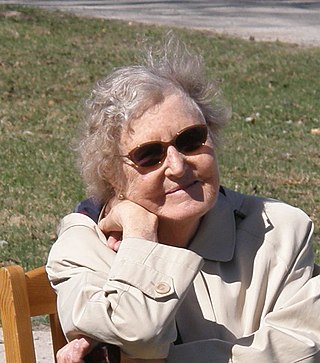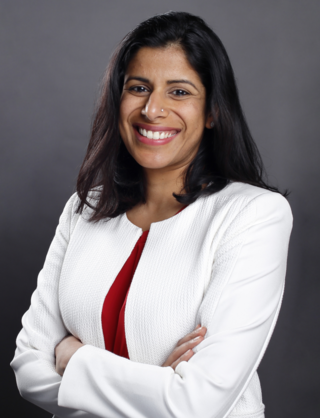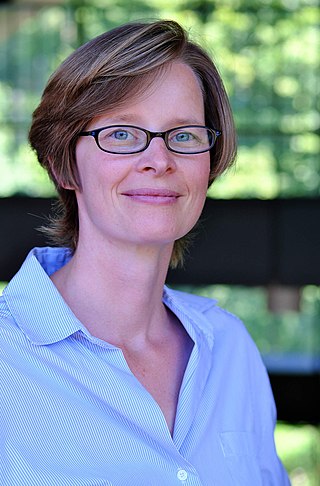Related Research Articles

John Anton Goldsmith is the Edward Carson Waller Distinguished Service Professor at the University of Chicago, with appointments in linguistics and computer science.
Adele Eva Goldberg is an American linguist known for her development of construction grammar and the constructionist approach in the tradition of cognitive linguistics.
Computer-mediated communication (CMC) is defined as any human communication that occurs through the use of two or more electronic devices. While the term has traditionally referred to those communications that occur via computer-mediated formats, it has also been applied to other forms of text-based interaction such as text messaging. Research on CMC focuses largely on the social effects of different computer-supported communication technologies. Many recent studies involve Internet-based social networking supported by social software.

Mary Rosamond Haas was an American linguist who specialized in North American Indian languages, Thai, and historical linguistics. She served as president of the Linguistic Society of America. She was elected a fellow of the American Academy of Arts and Sciences and a member of the National Academy of Sciences.
Naomi S. Baron is a linguist and professor emerita of linguistics at the Department of World Languages and Cultures at American University in Washington, D.C.
Jerry R. Hobbs is an American researcher in the fields of computational linguistics, discourse analysis, and artificial intelligence.
The Office of the Provost at Indiana University Bloomington oversees the academic programs, research, and policies of 16 schools on the Indiana University Bloomington campus. Together, these units offer more than 550 individual degree programs and majors.

Lucy Suchman is Professor Emerita of Anthropology of Science and Technology in the Department of Sociology at Lancaster University, in the United Kingdom, also known for her work at Xerox PARC in the 1980s and 90s.
Mary Bucholtz is professor of linguistics at UC Santa Barbara. Bucholtz's work focuses largely on language use in the United States, and specifically on issues of language and youth; language, gender, and sexuality; African American English; and Mexican and Chicano Spanish.
Sharon Inkelas is a Professor and former Chair of the Linguistics Department at the University of California, Berkeley.

Ilse Lehiste was an Estonian-born American linguist, author of many studies in phonetics.

Barbara J. Grosz CorrFRSE is an American computer scientist and Higgins Professor of Natural Sciences at Harvard University. She has made seminal contributions to the fields of natural language processing and multi-agent systems. With Alison Simmons, she is co-founder of the Embedded EthiCS programme at Harvard, which embeds ethics lessons into computer science courses.
Julia Hirschberg is an American computer scientist noted for her research on computational linguistics and natural language processing.
Beth Levin is an American linguist who is currently the William H. Bonsall Professor in the Humanities at Stanford University. Her research investigates the lexical semantics of verbs, particularly the representation of events and the kind of morphosyntactic devices that English and other languages use to express events and their participants.
Ellen F. Prince was an American linguist, known for her work in linguistic pragmatics.

Shahzeen Attari is a professor at the O'Neill School of Public and Environmental Affairs at Indiana University Bloomington. She studies how and why people make the judgements and decisions they do with regards to resource use and how to motivate climate action. In 2018, Attari was selected as an Andrew Carnegie Fellow in recognition of her work addressing climate change. She was also a fellow at the Center for Advanced Study in the Behavioral Sciences (CASBS) from 2017 to 2018, and received a Bellagio Writing Fellowship in 2022.
Anne Harper Anderson OBE FRSE former University of Glasgow Vice Principal and Head of the College of Social Sciences, and Gender Champion, specialising in communications including machine-human interaction. She served on the Engineering and Physical Sciences Research Council (EPSRC) which allocated £800million per annum for research. She was awarded an Order of the British Empire for services to social science (2002) and elected as a Fellow of the Royal Society of Edinburgh (2015).
Alice Geraldine Baltina ter Meulen is a Dutch linguist, logician, and philosopher of language whose research topics include genericity in linguistics, intensional logic, generalized quantifiers, discourse representation theory, and the linguistic representation of time. She is a professor emerita at the University of Geneva.
Samuel Gyasi Obeng is a Ghanaian-American linguist. He is currently Distinguished Professor of Linguistics and the Director of the West African Languages Institute (WALI) at Indiana University Bloomington (IUB). He is affiliated with IUB’s Linguistics Department, African Studies Program and holds Adjunct Professorship positions in the Departments of African American and African Diaspora Studies, Middle Eastern Languages and Cultures, and Islamic Studies

Vera Demberg is a German computational linguist and professor of computer science and computational linguistics at Saarland University.
References
- ↑ "Susan Herring". Experts & Speakers Faculty Profile. Indiana University. Archived from the original on 20 November 2011. Retrieved 3 March 2012.
- ↑ "Susan C. Herring". scholar.google.com. Retrieved 2022-09-15.
- ↑ Herring, Susan Catherine (1991). Functions of the Verb in Tamil Narration. UC Berkeley.
- ↑ "New IU center for computer-mediated communication". New IU center for computer-mediated communication. Retrieved 2022-09-15.
- ↑ Susan Herring to Receive the ASIS&T Award
- ↑ The Language of Social Media
- ↑ "Communication Styles Make a Difference". The New York Times . Archived from the original on 2023-02-04.
- 1 2 3 4 "Curriculum Vitae Susan C. Herring". Indiana University. 16 February 2012. Retrieved 6 December 2014.
- ↑ "Publications | Linguistics". lx.berkeley.edu. Retrieved 2022-09-15.
- ↑ "Susan C. Herring". Luddy School of Informatics, Computing, and Engineering: Profile. Retrieved 2022-09-15.